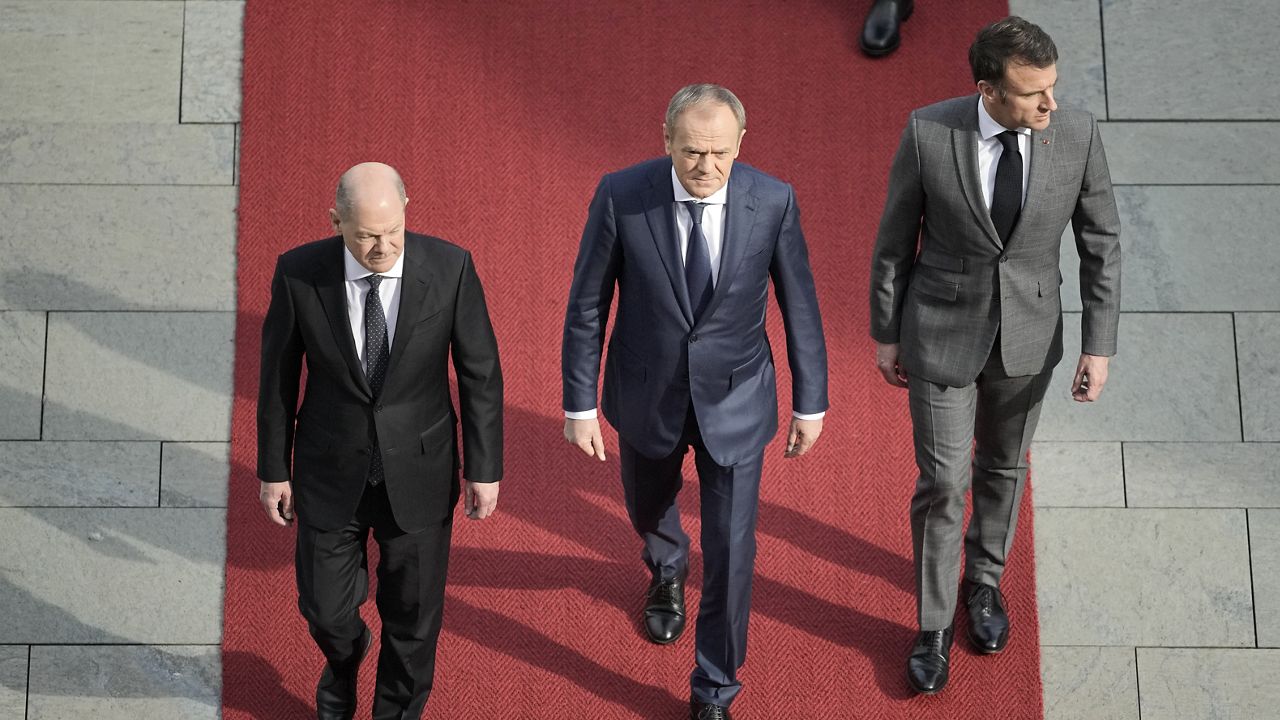The leaders of Germany, France and Poland met in Berlin on Friday to discuss support for Ukraine, seeking to send a signal of unity and solidarity as Kyiv grapples with a shortage of military resources and Russia votes in an election all but certain to extend President Vladimir Putin's rule.
German Chancellor Olaf Scholz welcomed French President Emmanuel Macron and Polish Prime Minister Donald Tusk for a summit of the so-called "Weimar Triangle" of the three major European powers, a format that they are trying to revitalize after relations were strained under Poland's previous nationalist government.
Kyiv's forces are hoping for more military supplies from Ukraine's Western partners, but in the meantime, they are struggling against a bigger and better-provisioned Russian army that is pressing hard at some front-line points in Ukraine. The European Union's plans to produce 1 million artillery rounds for Ukraine have fallen well short, while aid for Ukraine is being held up in the United States by political differences.
Ahead of the meeting, Tusk wrote on social network X, "True solidarity with Ukraine? Less words, more ammunition."
"We must do everything we can to organize as much support as possible for Ukraine," Scholz said on Wednesday, pointing to the "very practical question of whether there is enough ammunition, whether there is enough artillery, whether there is enough air defense — many things that play a major role."
He downplayed recent differences with Macron after the French leader said at a conference last month that sending in Western ground troops should not be ruled out in the future. Scholz said then that participants had agreed there will be "no ground troops" on Ukrainian soil sent by European countries.
On Thursday, Macron reiterated his position, though he said the current situation doesn't require sending ground troops.
Germany, France and Poland are among Ukraine's key allies. Germany has become Ukraine's second-biggest supplier of military aid after the United States and is stepping up support this year, although Scholz has faced criticism for refusing to send Taurus long-range cruise missiles.
Macron on Thursday described the Russia-Ukraine war as "existential" for France and Europe.
The three European leaders are meeting as Russia holds a three-day presidential election that is all but certain to give Putin another six years in power.
In Brussels, the EU's executive branch on Friday allocated $545 million to a project to reduce bottlenecks slowing the production of explosives and other materials used to manufacture artillery shells for the bloc and its allies. The European Commission estimates that the plan will allow industry to produce 1.7 million shells annually by the end of the year, and 2 million by late 2025.
Speaking in Washington on Thursday, EU foreign policy chief Josep Borrell said that a Ukrainian victory "is essential for European security, but I think it's also essential for the U.S." He warned of "the price of delaying decisions."
"I want to stress the importance of the time," he said. "Time is of the essence. The next month will be decisive. Many analysts expect a major Russia offensive this summer and Ukraine cannot wait on (the) result of the next U.S. elections."
Scholz and Tusk have both visited Washington recently and pressed for the U.S. to release aid for Ukraine.



